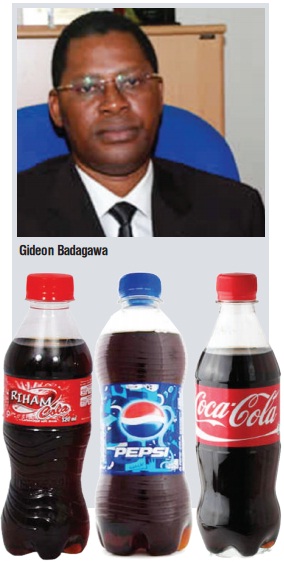Pepsi cuts retail prices on plastic bottle by Shs 200 but rivals still reluctant to play ball
On May 04, 2016 Crown Beverages, the bottlers of Pepsi Cola products, announced a reduction on their retail price for Mirinda, Mountain Dew, Pepsi Cola, and Evervess Tonic brands. The price reduction of Shs 200 was on all the 500ml pack size bottles, lowering them from Shs 1,700 to Shs 1,500.

In a statement, the company said the move was aimed at growing and defending its market share. While Jeff Ssekandi, the acting head of marketing, insisted that it was not another promotion, market observers are now waiting to see how the rivals will respond.
Uganda has two other carbonated soft drinks manufacturers – Century Bottling Company (Coca-Cola) and Riham. The last major price war was two years ago in April 2014 when both Coca-Cola and Pepsi cut the prices for the 500ml and one-litre plastic bottled sodas from Shs 2,000 to Shs 1,500 and from Shs 3,000 to Shs 2,500, respectively. Riham, a new entrant into the market, ignited the ‘price war’ when it cut the price of its 500ml products from Shs 1,500 to Shs 1,200. However, almost a month after Pepsi announced the price cuts, the retailers The Independent visited were still selling the products at the old price.
Gideon Badagawa, the chief executive officer of Private Sector Foundation Uganda (PSFU) says it’s not easy to determine if Pepsi’s action will spark another price war, which he says can happen in a competitive environment when one company seeks to have an edge over everyone else in the marketplace. But given the harsh business environment, reducing prices cannot be concomitant with the high production costs. The price war, argues, is therefore not relayed to cost structures but the desire to increase sales and profitability ratios.
This, he adds, often occurs with high performance targets. The idea is to reduce piles through increased off take. And this may not only be for sodas. “Everywhere you have perfect competition, price wars occur so that the price can only be used momentarily and once demand picks the product price is reinstated. Why? As long as there is still high cost of doing business such price cuts can never be sustainable,” he says.
Badagawa notes that recall demand is determined by among others the taste and one may not simply switch demand for sodas just on price difference. “My consideration is that the price cuts may not influence demand for the other like products. Moreover the price cuts usually are effective with very minimal product differentiation. Riham, Coca cola and Pepsi have significant differences with stratified demand. I’m certain therefore that demand is unlikely to be affected for the various products,” he added.
Economist Fred Muhumuza reasons that “Pepsi is trying to do self-preservation.” “I am sure the competition is biting and the demand is low. There is more competition within the industry from bottled water and juices. Pepsi may be the weakest link as it has no significant global backing to sustain a big advert campaign,” he says. “Besides, Coke cut costs significantly when they opted for plastic bottles that have no serious collection costs. Pepsi has already been dealing with marginal areas that are largely hard to reach and less profitable.”
Indeed, it is a month since the Pepsi made its move but their main competitor Coca Cola have not responded. Muhumuza suggests that Coke might simply increase its advertising then “play a wait and see game.” “I do not foresee them losing a significant market to Pepsi or others. They already have a presence in the water sector,” he adds. On the smaller industry players Muhumuza, says, smaller ones may also play a wait and see game before responding. Rihammay reduce or simply follow by increasing advertisements.
Another industry player who declined to be named said the price turf war is basically between Pepsi and the small players because the biggest market share is largely controlled by Coke, “which is the undisputed market leader.”
Commenting on the consumption trends of sodas, Muhumuza said it is a game of numbers but overall, there is less consumption of soda as people reduce parties and also seek more of water. The reduction should also be due to less demand from South Sudan, which was a key market for Pepsi.
To the consumers, a price war is always good news as they pay lower prices but a big a disadvantage to manufacturers as it affects their profitability, which in turn reduces tax revenue to government. According to the Uganda Bureau of Statistics, the carbonated soft drinks registered a growth of 10.3% in 2014.
 The Independent Uganda: You get the Truth we Pay the Price
The Independent Uganda: You get the Truth we Pay the Price



